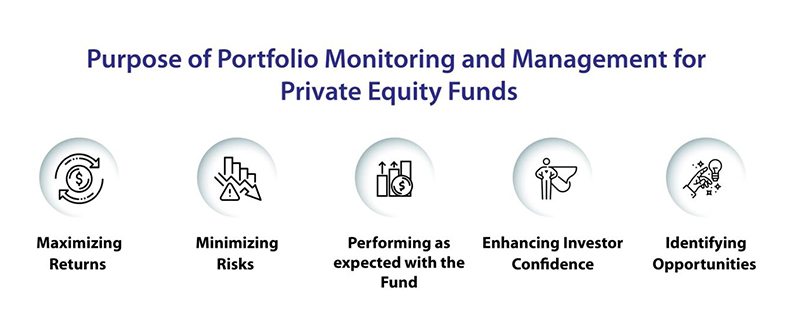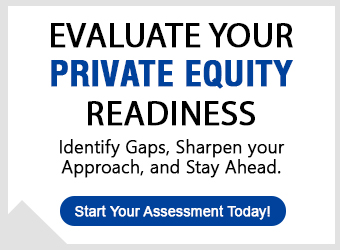Private equity portfolio management leads to the performance of successful entities that constitute private equity funds. Investment performance measurement is a process that aims at continuously following the operations and valuation of investments included in a fund’s assets. In this way, investment fund managers can be more confident about their decisions, define the room for further optimization and deliver the highest returns to their investors. Investments in private equity are often realized in private companies and other assets that are not publicly traded. Trading is not involved in private equity investments, unlike the stock exchange where public stocks are traded and are influenced by an ever-changing market. With this sort of investment, a longer-term commitment is required.
In private equity portfolio monitoring attention is paid to different performance indicators of each investment represented by financial information, operational efficiency reports, market trends, companies’ competitors, etc. Through the measurement of these factors, fund managers can spot red flags as well as positive signs, make correct choices and maximize the return on the investment by diversification of the portfolio.
What Is Portfolio Monitoring in Private Equity
The due diligence of private equity is a thorough process, which can be described as the gathering and examining of the data concerning the investments of a given fund. The data here include the financial statements, the operational metrics, the market trends, and others as well. We intend to help the fund managers understand the investment performance so that they may be able to analyse the changes in the portfolios.
The use of the equity valuation method is an important element to be minded in private equity portfolio monitoring. Fund managers make use of all the methods and techniques of valuation to ascertain the rational value of investments and their efficacy in the broader framework of equity funds. Implementation of sophisticated valuation techniques makes it possible for fund managers to form correct attitudes towards investment advocation and portfolio fine-tuning.
What is Portfolio Management
In private equity, portfolio management is the art of managing all the fund’s assets to reach the stated financial goals. It includes tasks like portfolio construction, risk management, and performance measurement. Highly successful portfolio management is a key contributor to maximizing returns and reducing risks of private equity investments. Adherence to a private equity portfolio management model is critical in ensuring that investment decisions are in line with the fund strategy and objectives. Fund managers apply advanced portfolio management procedures such as asset allocation optimisation, performance monitoring, and strategies shifts to exploit new profit chances.
Purpose of Portfolio Monitoring and Management for Private Equity Funds
-
01. Maximizing Returns
-
The implementation of systematic management of capital in private equity portfolios leads to sensibly combining resources and improving their productivity.
-
Through an efficient and innovative set of valuation methods that narrow down the opportunities of high performance such that the investors are compensated adequately in terms of returns.
-
02. Minimizing Risks
-
Using private equity portfolio management strategies to drive a proactive mode of the organization capable of prognosis of potential risk concentrations involving financial and operational resources.
-
Aligning systematic risk framing into portfolio supervision mechanisms to prevent the capital of investors from sliding away and secure long-term sustainability.
-
03. Performing as expected with the Fund
-
Aligning investment actions, with the ultimate aims and the objectives of the private equity fund, as the key routine of a meticulous portfolio monitor can support efficient management.
-
Applying rigorous private equity pre-investment screening processes and the portfolio management strategy specific to the private equity fund as the framework for ensuring the stability of profit and growth.
-
04. Enhancing Investor Confidence
-
Overcoming the fears among investors about returns and giving them confidence by practising authentic and effective private equity portfolio management techniques.
-
Providing investors with a frequent report on investment performance, risk management strategies, and compliance measures to be as transparent as possible with them and thus be able to create a long-term partnership between them.
-
05. Identifying Opportunities
-
Continue to pay attention to market trends and promote energetic development in the relevant industry to discover potential investment opportunities and exploit tactical options for growth.
-
Through data-driven insights which show where there are opportunities rather than where there aren’t, the customization of the portfolio can be done such that the objective of asset allocation is adhered to and the private equity portfolio management goal is met.
Effective Private Equity Performance Tracking
- Comprehensive Use of Equity Valuation Methods: Including a large number of equity valuation methods is fundamental to generating an exact tracking private equity investment performance indicator. For this matter, approaches embraced cover for instance, discounted cash flow (DCF) analysis, comparative company analysis (CCA), and proceeding transaction analysis (PTA). Such methods help to shape fund management not giving a separate approach for every investment, but providing an overall picture of the value and performance of these investments.
- Regular Monitoring and Analysis of Key Performance Indicators (KPIs): The financial analysis of the private equity funds involves regular monitoring and tracking of the main performance benchmarks like the return of investment (ROI), internal rate of return (IRR), and cash flow. Such assessment can facilitate performance assessment not only of an individual investment but the entire portfolio, giving fund managers insights that are key to their decisions.
- Integration of Advanced Portfolio Management Software: Utilizing sophisticated portfolio management tools that take into account **fair value estimations** subsequently would elevate performance metric abilities to a substantially high level. Those solutions are the software ones, which offer real-time data, reports tailored to the needs of managers, and the most up-to-date analytics tools, helping to see the whole portfolio from an angle of data-preferred decision-making.
-
In-depth Portfolio Analysis and Risk Assessment: Endeavoring the diagnostic of a portfolio using plural equity valuation methods will grant fund managers a chance to submit their investments to a broad array of performance assessment elements. Among others, these tasks imply drawing up conclusions from trends, picking those patterns that are important, and figuring out the issues that may arise from separate investments and the whole portfolio. Risk assessment is the key tool of the fund manager that allows them to assess risks and find the best possible solution for capital gains growth.
-
Adoption of Best Practices in Performance Tracking: Fine-tuning performance data monitoring by best practices is what is needed for gathering accurate and reliable performance data. It represents carrying out data reporting to investors, industry size comparison, and elaboration on the future effects of the rapidly changing financial markets. By adhering to these best practices, fund managers can consistently promote transparency, grow the confidence of the investors, and with the right decisions execute proper risk management to make the best outcomes.
Benefits of Private Equity Portfolio Monitoring

- Maximized Returns: Our monitoring of the actual portfolio helps and repairs the damaged assets and the reallocation of resources to the potential risk-free investment with a high rate of growth, which thereby gives the client investor the mean better returns.
- Risk Mitigation: By carefully noticing the investments and also the market trends the fund financier can exactly identify and manage the risks that usually accompany private equity funds and, in the end, the investor is saved money and possibly losing.
- Strategic Decision Making: The ground-breaking analytics function of the fund allows the portfolio managers to scrutinize the data regarding the investment activities and market conditions in real-time and as a result aid the prompt making of the right decisions to meet the fund goals with the high returns.
-
Enhanced Investor Confidence: The ongoing flow of meaningful and honest portfolio monitoring fosters trust as investors have an easy way of assessing the fund’s outcome as well as the level of risk taken. It builds faith/relationships that can withstand long periods between the investors and the portfolio managers.
-
Operational Efficiency: Appropriate and effective monitoring of portfolios will allow us to practice many business processes, increase productivity and reduce administrative costs, crowning our work with such crucial things as due diligence and strategic consideration of the chosen fund.
Conclusion
In the end, private equity success is practically tied to ongoing portfolio monitoring and management. Using equity valuation strategies and implementing model portfolio management in the private sector, managers undertake responsible decisions, risk mitigation and maximum payment for the investors. Developing a policy like this would guarantee the private equity fund’s stability and growth in the long run extending the confidence of the investors and attracting the new capital as well. Eventually, portfolio monitoring and management represent the fundamental elements to achieve success in the private equity marketplace that is characterized by dynamic changes and highly volatile conditions.







